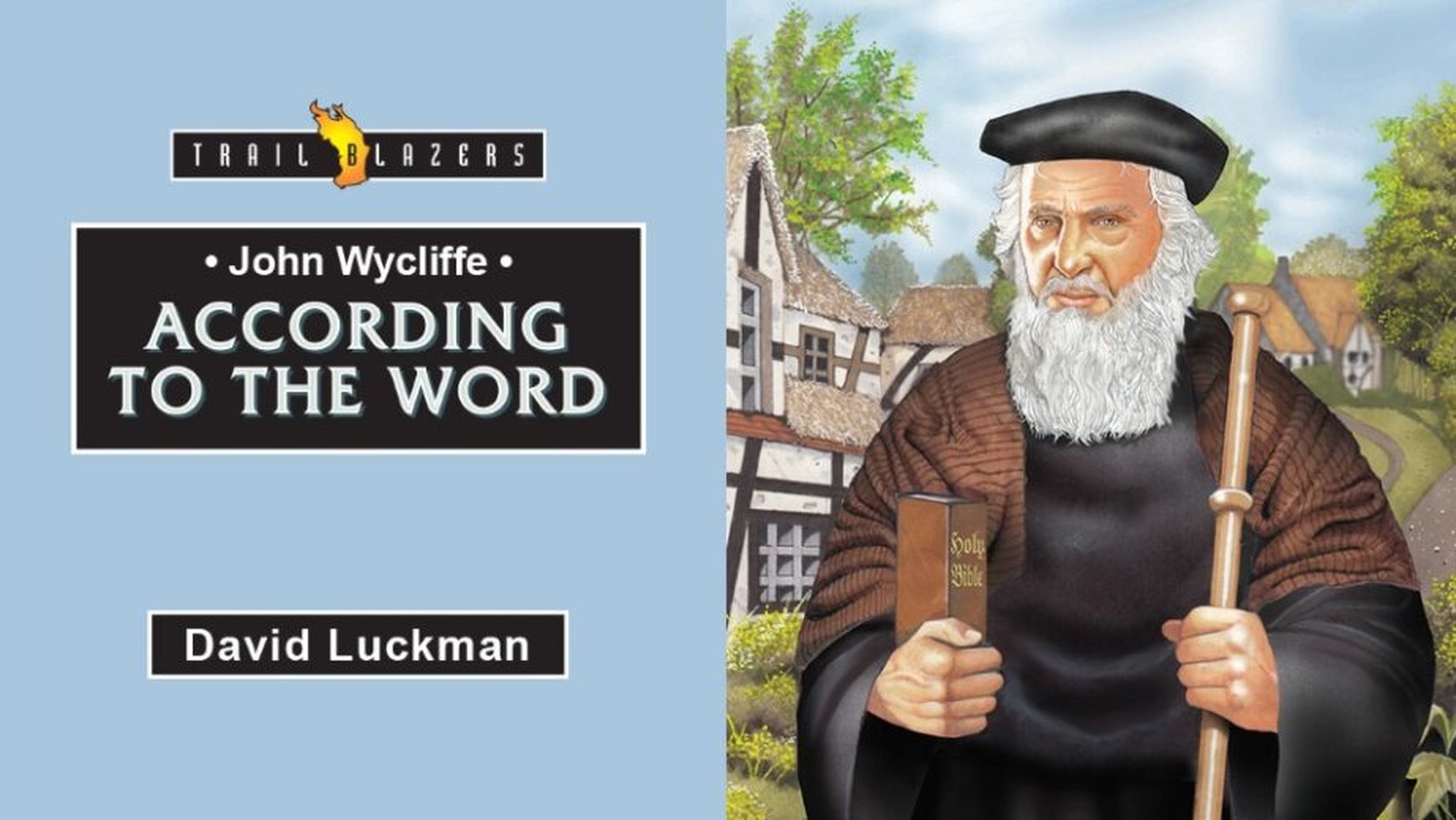
During 2024, Wycliffe Bible Translators celebrate the 700th anniversary of John Wycliffe’s birth in 1324. To commemorate the birth of this remarkable English Reformer, John Wycliffe – According to the Word has been published in the Trail Blazers series of the CF4K imprint of Christian Focus Publications.
John Wycliffe was born in the north of Yorkshire, on the banks of the Tees, during the reign of Edward II. He died in 1384 when Richard II was on the throne of England. He was born over a century before printing was invented and died nearly 100 years before the historic leader of the Reformation, Martin Luther, was born.
John Wycliffe lived in what was arguably the darkest period in the history of English Christianity. It was a time when the Roman Church reigned supreme. England was buried under a mass of ignorance and superstition.
In those days, John Wycliffe saw the need of the people to have the Word of God in their own language. He wanted everyone in the realm of England to have the opportunity to read of the wonderful works of God in Christ Jesus. In his treatise “On The Truth Of Holy Scripture”, Wycliffe maintained the sufficiency of the Word of God for all purposes of doctrine, discipline, and conduct. He wrote, ‘A Christian man, well understanding it, may gather sufficient knowledge during his pilgrimage on earth; that all truth is contained in Scripture; that we should admit of no conclusion not approved there; that there is no court beside the court of heaven; that though there were a hundred Popes, and all the friars in the world were turned into cardinals, yet should we learn more from the Gospel than we should from all that multitude.’
‘A Christian man, well understanding it, may gather sufficient knowledge during his pilgrimage on earth; that all truth is contained in Scripture; that we should admit of no conclusion not approved there; that there is no court beside the court of heaven; that though there were a hundred Popes, and all the friars in the world were turned into cardinals, yet should we learn more from the Gospel than we should from all that multitude.’
With the Latin Vulgate opened before him, John translated those great truths which had been a strength, guide, and consolation to him all his life. He oversaw the monumental task of translating the whole Bible until the work was completed in 1382.
The importance of preaching the Bible was also deeply impressed upon John Wycliffe. ‘The highest service,’ he said, ‘that man may attain to on earth is to preach the Word of God.’
John saw the mendicant friars strolling around the country, peddling the legends of saints and papal superstitions, and filling their purses with ill–gotten gains. This angered John immensely, so that one of his chief aims was to counteract the friars’ baneful influence on the people. For him, the friars were preaching for their own glory and satisfaction. His “Bible Men”, however, would preach solely for the glory of God.
Addressing his itinerant “Bible Men” – the most pious of his disciples, John said, ‘Go and preach, it is the sublimest work. After your sermon is ended, visit the sick, the aged, the poor, the blind, and the lame, and succour them according to your ability.’
So, the ordinary person who could not read had a messenger to give them the good news of Christ Jesus, and those who could read had the word of God, which they could read to friends and neighbours alike. In this way, John Wycliffe became a fourteenth century missionary operation – like the Bible Translators and the City Mission rolled into one.
As the scriptural doctrines of John Wycliffe permeated the realm of England, those same doctrines spread to Europe. Anne of Bohemia, who married Richard II in 1382, was an avid reader of John’s writings. Through her influence and those connected with her court, John Wycliffe’s doctrines found a footing in Eastern Europe. John Huss and Jerome of Prague accepted them with eagerness. It is not surprising therefore that the works of the English Reformer John Wycliffe were widely circulated in Bohemia.
Other large areas of Europe were influenced by Lollardy – “Lollards” was the nickname for John Wycliffe’s sympathisers and “Bible Men”. These areas became notable strongholds of Puritanism in the seventeenth century, indicating the strength of influence exerted in the fourteenth century by the advance of John’s scriptural teachings.
It was to be expected, however, that such proceedings as these in England and other parts of Europe would not go unchallenged by those who extorted ordinary people in the name of God. William Courtenay, previously the Bishop of London, who had succeeded the murdered Sudbury as the Archbishop of Canterbury, summonsed an assembly of ecclesiastical dignities in Blackfriars, London, in 1382. Although the proceedings were disturbed by an earthquake, the court managed to condemn John’s scriptural teachings as heretical and erroneous. Yet in the Providence of God, he escaped actual punishment to the day of his death, on 31st December 1384.
Astonishingly, it wasn’t until 1414, thirty years after his death, that John Wycliffe was declared a “heretic” by the Council of Constance. His bones were not exhumed and burned until 1427, and his ashes were scattered into the River Swift.
The way to reformation was prepared by the Biblical teachings of the Oxford Don and Rector of Lutterworth, John Wycliffe. We should thank God for him, and pray for more like him!



